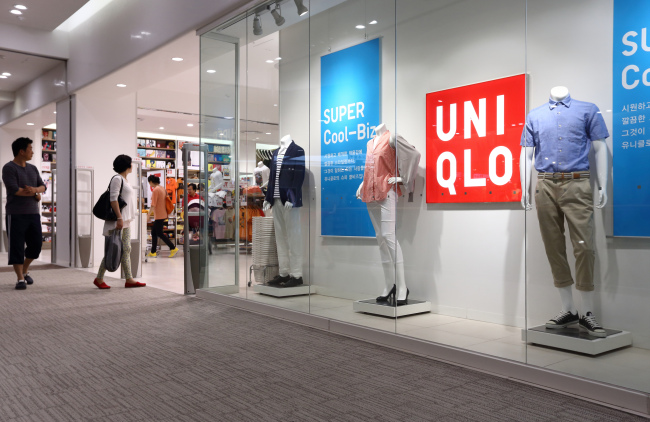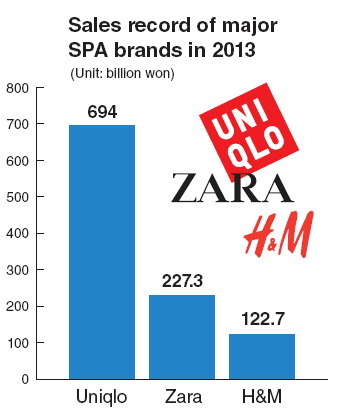
The sales of Uniqlo, Zara and H&M, known as the troika of specialty store retailers of private label apparel (SPA), surpassed 1 trillion won ($974 million) last year in South Korea, the Financial Supervisory Service said Wednesday.
The figure is up some 30.7 percent from the previous year, suggesting that the SPA market is still in its heyday despite a dull forecast by market insiders.
According to the report, Uniqlo reported 694 billion won in sales last year. The Japanese brand, which launched here in 2006, sold 20.5 billion won worth of apparel in its first year but marked an average of 67 percent annual growth every year since and became the largest SPA brand in the country.

Zara, from Spain, reported 227.3 billion won in sales last year while Swedish label H&M marked 122 billion won.
The accumulated sales of the three brands exceeded 1 trillion won, which is about a 30.7 percent jump from 2012’s 765 billion won.
Homegrown brands also performed impressively.
Samsung Everland’s Eight Seconds marked 130 billion won in sales while local retail giant E-Land’s Spao and Mixxo reported 140 billion won and 100 billion won, respectively. Eight Seconds and Spao showed a twofold and 40 percent rise, respectively.
“SPA brands provide the trendiest designs at a reasonable price. For the past four to five years the market showed double-digit growth,” a market insider said.
And the ever-growing market has become the latest darling of not only existing brands but also newcomers such as Joe Fresh, GU and COS, which are slated to be introduced by the end of the year.
Market insider warned that the market is saturating. In fact, Zara and H&M showed 11.5 percent and 36.3 percent growth, respectively ― lower than previous years.
“I don’t see the market growing as fast and loud as it used to. Before, shopping malls hosted SPA brands to draw traffic by giving cheaper rents for better locations. But nowadays, those incentives are moving towards famous or popular restaurants. This means that SPA is not trendy anymore,” he said.
By Bae Ji-sook (baejisook@heraldcorp.com)
The figure is up some 30.7 percent from the previous year, suggesting that the SPA market is still in its heyday despite a dull forecast by market insiders.
According to the report, Uniqlo reported 694 billion won in sales last year. The Japanese brand, which launched here in 2006, sold 20.5 billion won worth of apparel in its first year but marked an average of 67 percent annual growth every year since and became the largest SPA brand in the country.

Zara, from Spain, reported 227.3 billion won in sales last year while Swedish label H&M marked 122 billion won.
The accumulated sales of the three brands exceeded 1 trillion won, which is about a 30.7 percent jump from 2012’s 765 billion won.
Homegrown brands also performed impressively.
Samsung Everland’s Eight Seconds marked 130 billion won in sales while local retail giant E-Land’s Spao and Mixxo reported 140 billion won and 100 billion won, respectively. Eight Seconds and Spao showed a twofold and 40 percent rise, respectively.
“SPA brands provide the trendiest designs at a reasonable price. For the past four to five years the market showed double-digit growth,” a market insider said.
And the ever-growing market has become the latest darling of not only existing brands but also newcomers such as Joe Fresh, GU and COS, which are slated to be introduced by the end of the year.
Market insider warned that the market is saturating. In fact, Zara and H&M showed 11.5 percent and 36.3 percent growth, respectively ― lower than previous years.
“I don’t see the market growing as fast and loud as it used to. Before, shopping malls hosted SPA brands to draw traffic by giving cheaper rents for better locations. But nowadays, those incentives are moving towards famous or popular restaurants. This means that SPA is not trendy anymore,” he said.
By Bae Ji-sook (baejisook@heraldcorp.com)
-
Articles by Korea Herald










![[Hello India] Hyundai Motor vows to boost 'clean mobility' in India](http://res.heraldm.com/phpwas/restmb_idxmake.php?idx=644&simg=/content/image/2024/04/25/20240425050672_0.jpg&u=)









